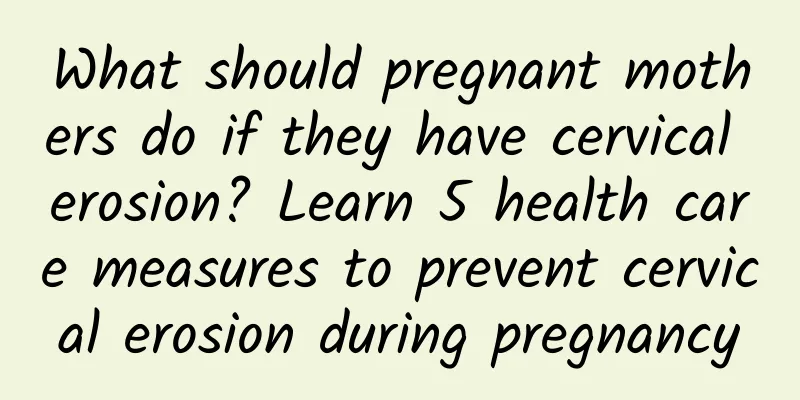5 behaviors of men may increase the probability of their wives suffering from cervical cancer. Women should pay attention to this

|
"Doctor, my wife was usually in good health, how could she suddenly get cervical cancer?" Mr. Zhang asked anxiously. A few months ago, Mr. Zhang's wife, Ms. Li, was diagnosed with cervical cancer during a physical examination. This news was like a bolt from the blue, and the family fell into deep pain and confusion. Ms. Li usually pays attention to healthy diet and regular exercise, how could she get such a serious disease? With this question, Mr. Zhang accompanied his wife to the hospital. 1. The invisible killer of cervical cancer Cervical cancer is a common gynecological malignancy, the main cause of which is persistent infection with human papillomavirus (HPV). HPV is mainly transmitted through sex, and there are generally no obvious symptoms after infection. Many women will not discover the early lesions or cancer of cervical cancer until many years later. In addition to HPV infection, other factors such as early marriage and childbearing, multiple births, multiple sexual partners, long-term smoking, and low immunity can also increase the risk of cervical cancer. According to statistics from the World Health Organization, there are approximately 570,000 new cases of cervical cancer worldwide each year, of which approximately 85% occur in developing countries. After understanding the risk factors for cervical cancer, we need to pay special attention to some male behaviors that may indirectly increase the risk of cervical cancer in women. 2. Five behaviors of men may "push" their wives toward cervical cancer 1. Foreskin is too long and unhygienic If men with foreskin that is too long do not pay attention to personal hygiene, smegma will easily accumulate and breed bacteria and viruses. Studies have shown that smegma contains a large number of HPV viruses, which can be transmitted to women during sexual intercourse, increasing their risk of HPV infection. Cleaning the foreskin can effectively reduce the growth of bacteria and viruses and reduce the risk of HPV transmission. Therefore, men should maintain good personal hygiene habits, especially those with long foreskin, who should pay attention to cleaning their foreskin regularly. 2. Don’t like to use condoms Condoms not only prevent pregnancy, but also protect against sexually transmitted diseases, including HPV. The use of condoms can greatly reduce the risk of HPV transmission and protect your partner from infection. Some men are reluctant to use condoms because they find it troublesome or affects the sensation, but this behavior actually increases the risk of their partners contracting sexually transmitted diseases. Therefore, for the health of their partners, men should insist on using condoms during sexual intercourse. 3. Having multiple sexual partners The more sexual partners you have, the greater your chance of contracting HPV. If a man has multiple sexual partners and one of them is infected with HPV, he may transmit the virus to other partners through sexual intercourse. Multiple sexual partners not only increase women's risk of HPV infection, but also increase their likelihood of developing cervical cancer. Maintaining a monogamous relationship not only reduces the risk of sexually transmitted diseases, but also maintains family harmony. Therefore, being faithful to your partner is one of the important measures to prevent cervical cancer. 4. Suffering from sexually transmitted diseases Sexually transmitted diseases such as genital warts, gonorrhea, and syphilis not only harm men's own health, but can also be transmitted to their partners through sexual intercourse, increasing their risk of cancer. For example, genital warts are caused by the HPV virus. If a man has genital warts, the virus can easily be transmitted to women during sexual intercourse, increasing their risk of HPV infection. Men should actively treat sexually transmitted diseases to avoid transmitting the virus to their partners. At the same time, have regular sexual health checks to detect and treat potential problems in a timely manner. 5. Neglecting your partner’s health Regular gynecological examinations can detect cervical precancerous lesions and other gynecological problems early, and timely treatment can effectively prevent the occurrence of cervical cancer. However, many men neglect their partners' health checks and do not encourage or accompany their wives for regular physical examinations, causing them to miss the opportunity for early detection and treatment. Caring about your partner's health and encouraging them to undergo regular gynecological examinations is one of the important measures to prevent cervical cancer. Men should actively support their partners' health checks and work together to maintain family happiness and harmony. 3. Popular Science Knowledge: How to Prevent Cervical Cancer 1. Get the HPV vaccine HPV vaccine can effectively prevent high-risk HPV infection, thereby reducing the risk of cervical cancer. The HPV vaccine is most effective when administered to women aged 9-26, and the effect is particularly significant in unmarried and childless women. Currently, HPV vaccine has been widely used around the world, and vaccination can significantly reduce the incidence of cervical cancer. 2. Regular screening Cervical cancer screening includes a Pap smear test and an HPV test. Regular cervical cancer screening can detect cervical precancerous lesions and early cervical cancer early, and timely treatment can greatly improve the cure rate. It is generally recommended that women over 21 years of age have a cervical smear test every 3 years, and women over 30 years of age have a cervical smear test and HPV test every 5 years. 3. Healthy Lifestyle Leading a healthy lifestyle can boost your immunity and reduce your risk of HPV and other sexually transmitted diseases. Here are some specific suggestions: ●Maintain a monogamous relationship: Reducing the number of sexual partners can reduce the risk of contracting HPV and other sexually transmitted diseases. ●Use condoms: Condoms not only prevent pregnancy, but also prevent sexually transmitted diseases, including HPV virus. ●Pay attention to personal hygiene: especially men, pay attention to the cleanliness of foreskin to reduce the growth of bacteria and viruses. ●Healthy diet: Eat more fresh fruits and vegetables, maintain a balanced diet, and enhance immunity. ●Quit smoking and limit alcohol consumption: Smoking and excessive drinking weaken the immune system and increase the risk of HPV infection and other diseases. 4. Early treatment If cervical precancerous lesions or early cervical cancer are found, timely treatment can effectively prevent the progression of the disease. Common treatments include cryotherapy, laser therapy, and surgery. Early treatment can greatly improve the cure rate and reduce the risk of complications and recurrence. 5. Psychological support The diagnosis and treatment process of cervical cancer is a huge psychological challenge for patients and their families. Family members should give patients full support and encouragement to help them build confidence in overcoming the disease. At the same time, if necessary, you can seek professional psychological counseling and support to relieve psychological pressure and enhance your ability to resist disease. Cervical cancer is a cancer that can be prevented and detected early, but it still poses a serious threat to women's health. Some male behaviors, such as not paying attention to personal hygiene, not using condoms, having multiple sexual partners, having sexually transmitted diseases, and neglecting the health of their partners, may indirectly increase the risk of cervical cancer in women. Therefore, male friends need to raise their health awareness, care about their partners' health, and work together to prevent cervical cancer. Through measures such as HPV vaccination, regular screening, maintaining a healthy lifestyle, early treatment and psychological support, the incidence of cervical cancer can be effectively reduced and women's health can be protected. I hope that every female friend can pay attention to their own health, check regularly, prevent early, and work together to create a healthy and beautiful life. Follow me to learn more about health knowledge and protect the health of you and your family! |
>>: Physical examination HPV cervical erosion
Recommend
Is it useful to take soy isoflavones for irregular menstruation?
Eating soy isoflavones may have a certain effect ...
What are the symptoms of ovarian cysts?
What is an ovarian cyst? What are the symptoms? I...
How to take care of uterine fibroids after surgery What can I eat after uterine fibroids surgery
Although uterine fibroids are benign fibroids, th...
If you have irregular menstruation, you should learn how to take care of yourself
The most common problem in women's physiologi...
Can Chinese medicine treat uterine effusion?
Clinically, uterine effusion can be divided into ...
Secondary symptoms of cervical precancerous lesions
Cervical precancerous lesions are relatively comm...
Analyze the causes of vulvar leukoplakia
The incidence of vulvar leukoplakia is as high as...
Will cervical warts never recur after recovery?
Everyone is troubled by the occurrence of cervica...
I had a miscarriage. What can I eat to get rid of the blood?
Bleeding after miscarriage is part of the natural...
What can you eat to treat dysmenorrhea? 4 kinds of food have the effect
Dysmenorrhea is a gynecological symptom. Due to t...
Experts analyze the causes of chronic cervicitis
What are the causes of chronic cervicitis? How do...
Mid-Autumn Festival barbecue, devilish body "Barbie Q"? Nutritionist reveals: Each consumption of barbecue sauce adds 20 calories
Mid-Autumn Festival barbecue, devilish body "...
Spring cleaning for the New Year, backache and joint pain? Rehabilitation doctors recommend 6 tips to help relieve pain
One or two weeks before the Chinese New Year, the...
What should women pay attention to in their diet during menopause?
During menopause, you need to pay attention to so...
How much does it cost to have a painless abortion in Beijing?
Women who are undergoing painless abortion surger...









